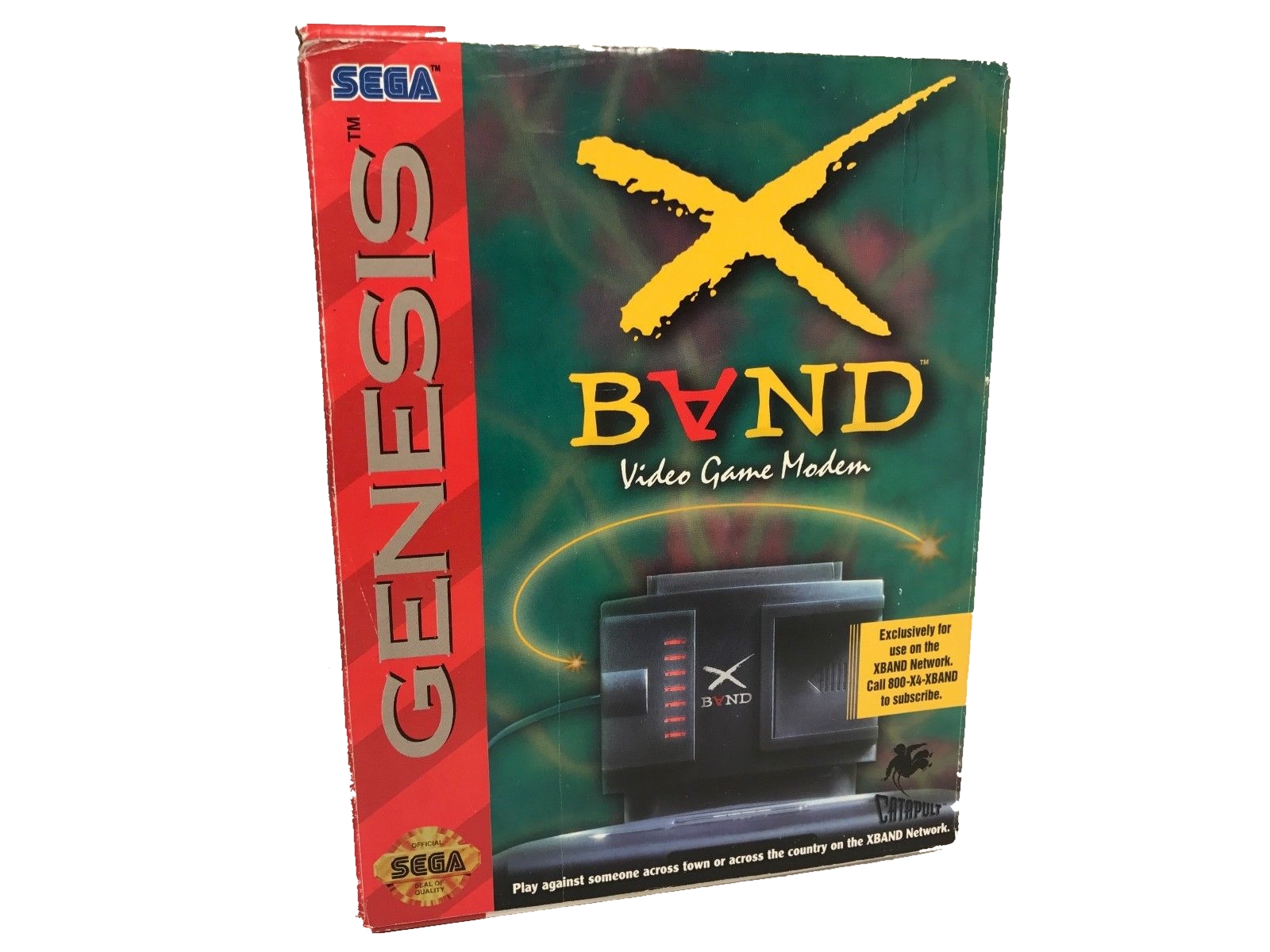|
|
|
History
Although it was not the first to attempt it, X-Band was the first device to support online play for video game console. It was developed by Catapult Entertainment, a Cupertino, California-based software company. The company was the result of a joint venture between Viacom, Blockbuster Entertainment Corp. and Nissho Iwai.
Based on a 2400 bps modem, which required about 1 hour to transfer 1 MB of data, Catapult Entertainment faced many challenged to provide a lag free gameplay. The main issue was to keep the game synchronized between the hardware, the different software revision and distance between the players.
To achieve this, Catapult Entertainment engineers manage to customize the modem to reduce the transmission delays from 1/5 of a second to 1/30 of a second. The second technique was to synchronize the speed control crystal of both machines to ensure the game would run at the same rate. Finally, the software version of all supported games would be taken into consideration and the device would compensate for any discrepancy between version to ensure that the system remain in-sync.
The client-side system worked by manipulating the game’s memory in a way similar to Game Genie. Catapult had to individually reverse engineer each game’s code, then develop a hack to intercept two-player activity so the game could be shared via modem. This represented a huge problem, but Catapult Entertainment hoped that game developer would include the XBAND functionality directly in their upcoming title.
X-Band gave the distribution right to T-HQ and team-up with EA to create promotional event around the X-Band.
Features
The X-Band modem supported a number of features including:
- Up to four account per devices, which allowed four different players in an household to have its own account
- Each account would have its own:
- Nickname
- An avatar selected from a list of 50 different icons
- Could be password protected
- Buddy list
- XBAND Mailbox (X-Mail)
- Players could request a match from players with similar skill or from their buddy list
- Players could send a taunt and chat with each other
- All wins/losses would be reported to a Global Ranking that could be seen by everyone and would be used to match up the player against people of the same skillset.
- Two Online newspaper called Bandwidth and X-Band news with news on upcoming games, tournament, etc.
- Parent control to restrict the usage between certain time of days, restrict long distance call, etc.
Release
The X-Band was officially launched on November 17, 1994 for the Genesis. At launch, the X-Band was detailed for $69.95 while the subscription to the X-Band network was $7.95 per month. Initially, the system only supported 6 games (Mortal Kombat I & II, NBA Jam, Madden NFL ’95 and NHL ’94 & ’95) and was available only in New York, Los Angeles, San Francisco, Dallas and Atlanta. Catapult Entertainment launched a multi-million dollars campaign with television spots on the MTV, Fox and NBC television network shows, “NFL Football,” “The Simpsons,” “Married With Children” and “Fresh Prince of Bel Air,” among others. Radio spots in the city where de device was available as well of a print advertising campaign in the major video game magazines was run October through December.
On Friday, Nov ember 25th, Catapult Entertainment and EA organized a coast to coast Madden NFL ’95 competition to promote the X-Band capability. The contest pit against each other, Dean Cain, who played Clark Kent/Superman on ABC’s “Lois and Clark: The New Adventures of Superman,” against Bobby Houston and Marcus Turner of the New York Jets. The event, co-sponsored by local radio stations KIIS-FM in Los Angeles and KISS-FM in New York,
The release was considered a success and Catapult continue their expansion plan with the release of SNES version in June 1995 and the addition of new supported games and cities. The service was announced to be released on PC for fall of 1995. No special modem was planned for this released. A free software would be available to all PC owner with a modem and hoped to be able to bundled it with new Pentium PC’s. The cost of the subscription was announced at less than 10$ a month.
In an interview in August 1995, Lynn Heublein, Business Development VP at Catapult Entertainment explained they were projecting 75,000 – 100,000 users by the end of the year. By that time, the cost of the modem was reduced to $19.99 and was available directly at any BlockBuster.
Demise
By 1996, the number of users was stagnating and the company had difficulty to turn any profits. Their project in term of users was far from being reach as the services peaked at 15,000 users. Their hope that the game developer would incorporate support for XBAND was also short lived as only the game Weaponlord released in October 1995 for both the Genesis and the SNES ultimately supported XBAND natively. To add more game, XBAND had to dedicate resources to reverse engineer the code which required money they didn’t had.
The owner of Catapult Entertainment finally lost faith in their product and, on July 1996, they enter in agreement to sell the company to Mpath, another Online video game network that specialized in PC online gaming.
By joining their forces with Catapult, MPath hoped they would become a major player in the online market. Sega still had hope for this alliance and decided to support the XBAND network directly via the Sega Net Link for the Sega Saturn.
But all efforts were in vain as by March 16, 1997, Catapult removed long-distance play and on April 30, 1997, the entire network was removed. Catapult Entertainment

